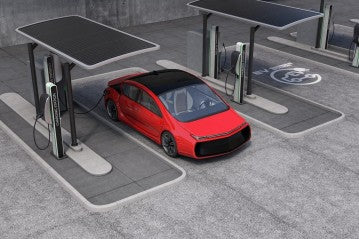
As the popularity of electric vehicles (EVs) continues to grow, so does the interest in utilizing clean and renewable energy sources for charging them. Solar power, with its environmental benefits and potential cost savings, has become an attractive option for many EV owners. In this blog post, we will explore the concept of using a portable solar charger for electric cars. We will discuss the feasibility, benefits, and limitations of this solution to help you make an informed decision when considering solar energy for your electric vehicle.
I. Understanding Portable Solar Chargers
Solar Charger: How Does It Work?
Before we delve into the compatibility of portable solar chargers with electric cars, let's understand how these devices work. Portable solar chargers are compact units equipped with photovoltaic (PV) panels that convert sunlight into electricity. They are designed to capture solar energy and store it in an integrated battery or transfer it directly to a connected device.
Portable solar chargers typically feature multiple solar panels that generate direct current (DC) power when exposed to sunlight. The DC power is then converted into alternating current (AC) or stored in a battery, depending on the charger's design and functionality. These chargers often come with built-in USB ports, AC outlets, or DC connectors to cater to various charging needs.
II. Portable Solar Chargers for Electric Cars: Feasibility and Benefits
Compatibility and Suitability for EV Charging
1. Understanding the Limitations:
While the idea of using solar energy to charge your electric vehicle is undoubtedly enticing, it's important to consider the limitations of portable solar chargers. One significant constraint is the limited power output of these devices compared to the energy requirements of electric cars. Portable solar chargers are typically designed to charge smaller devices like smartphones, tablets, or laptops, and their power output may not be sufficient for charging an electric car's battery.
2. Supplementing Charging Needs:
Although portable solar chargers may not provide a complete charging solution for electric cars, they can still play a valuable role as supplemental chargers. You can use them to trickle charge your EV's battery, especially in situations where you're parked for an extended period, such as during outdoor events, camping trips, or at your workplace. These chargers can help maintain or slightly increase your car's charge level, reducing reliance on the main power grid.
3. Emergency Charging and Off-Grid Scenarios:
Portable solar chargers shine brightest in emergency situations or off-grid scenarios. If you find yourself stranded with a depleted battery and no access to conventional charging infrastructure, a portable solar charger can act as a lifeline, providing a small amount of charge to get you moving or at least reach a charging station. Moreover, they are ideal for off-grid adventures, allowing you to embrace sustainable energy and recharge your vehicle's battery in remote locations.
III. Considerations and Limitations
Factors to Keep in Mind When Using a Portable Solar Charger for Your Electric Car
1. Solar Charger Power Output:
As mentioned earlier, the power output of portable solar chargers may not be sufficient to charge an electric car's battery fully. When considering a portable solar charger, pay attention to its wattage, as higher wattage translates to more power output. It's important to match the power requirements of your EV with the charger's capabilities to ensure efficient charging.
2. Battery Capacity:
The battery capacity of a portable solar charger is crucial, especially if you plan to store solar energy for later use or charge your electric car during the night or in cloudy conditions. A larger battery capacity allows for more energy storage and ensures a steady power supply to your vehicle.
3. Portability and Ease of Use:
When choosing a portable solar charger, consider factors like size, weight, and ease of transportation. Opt for a lightweight and compact design that suits your needs, especially if you plan to carry it during outdoor activities or travels.
Conclusion
While portable solar chargers may not provide a comprehensive charging solution for electric cars, they do offer valuable benefits in certain scenarios. They can serve as supplemental chargers, emergency backup solutions, and facilitate off-grid charging. By harnessing the power of the sun, you can reduce your carbon footprint and embrace renewable energy sources.
When considering a portable solar charger for your electric vehicle, it's important to understand its limitations in terms of power output and compatibility. Evaluate the charger's wattage, battery capacity, and portability to ensure it aligns with your specific needs.
Remember, a portable solar charger should be seen as a complementary tool in your charging arsenal, rather than a primary charging solution. Combining it with other charging options, such as dedicated home charging stations or public charging infrastructure, will provide a comprehensive and reliable charging experience for your electric car.
Embrace the potential of solar energy to power your electric vehicle, and make a conscious choice towards a cleaner, greener future.


0 comments